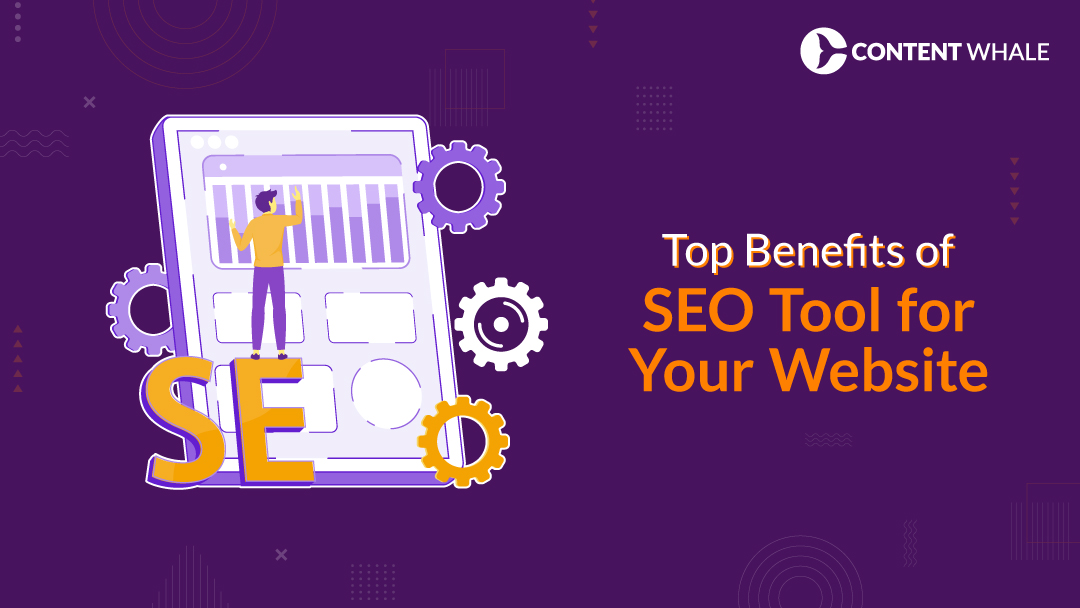Summary
SEO tools offer significant benefits by enhancing efficiency and accuracy in optimization efforts. By utilizing the best SEO tools, you can streamline keyword research, track performance, and automate routine tasks. Discover the tool advantages of integrating SEO software into your workflow and explore how these tools can boost your website’s performance with valuable SEO resources.
Search engine optimization (SEO) is crucial for boosting your online presence and driving traffic to your website. As digital marketing evolves, businesses need effective tools to enhance their SEO efforts. SEO tools offer significant benefits, simplifying tasks like keyword research, on-page optimization, and backlink analysis.
These tools save time and increase SEO tool efficiency by automating routine tasks. They provide valuable SEO resources to identify and fix issues, ensuring optimal site performance. Utilizing SEO software allows you to focus on strategic aspects while the tools handle data and analysis.
By using the best SEO tools, you gain insights into your website’s performance, track competitor strategies, and receive detailed reports on SEO metrics. These tool advantages help you make informed decisions and adjust strategies for better results. The SEO software benefits extend beyond automation, offering a comprehensive solution for your SEO needs.
Incorporating SEO tools for optimization improves your site’s rankings and enhances your overall digital marketing efforts. By leveraging these tools, you can stay ahead of the competition and achieve your business goals more effectively. The SEO tools advantages are clear, making them indispensable for any successful digital marketing strategy.
Understanding SEO Tools
SEO tools are essential for enhancing website performance and improving search engine rankings. These tools can be categorized into several types, each addressing specific SEO needs:
- Keyword Research Tools: Identify high-value keywords to drive traffic to your site. Examples include Google Keyword Planner and SEMrush.
- On-Page SEO Analyzers: Evaluate content for optimization opportunities. Popular tools are Moz and Yoast.
- Technical SEO Audit Tools: Identify technical issues affecting your site’s performance. Screaming Frog and Sitebulb are well-known options.
- Backlink Analysis Tools: Provide insights into your site’s backlink profile and help find link-building opportunities. Ahrefs and Majestic are top choices.
These tools streamline various SEO tasks, making them more efficient and effective.
Popular SEO Tools and Their Features:
- Google Analytics: Offers insights into user behavior and overall site performance.
- Ahrefs: Excels in competitor analysis and backlink tracking.
SEO Software Benefits include:
- Increased efficiency
- Improved accuracy
- Better decision-making capabilities
Understanding the tool features and their applications helps in choosing the best SEO tools that align with your goals. These SEO tools advantages are invaluable for optimizing your website, enhancing performance, and staying competitive in the digital market. Whether for keyword research, on-page optimization, or technical audits, these tools are integral to a successful SEO strategy.
Key Benefits of Using SEO Tools

Using SEO tools offers significant benefits that enhance your website’s performance and optimization efforts. Here are the key advantages:
1. Improved Efficiency in Keyword Research
SEO tools like Google Keyword Planner and SEMrush enable quick and accurate keyword research. This helps identify high-value keywords that drive targeted traffic, saving time and ensuring effective keyword strategy.
2. Enhanced Tracking and Measurement
SEO software such as Google Analytics and Ahrefs provide detailed tracking and measurement capabilities. These tools offer insights into metrics like organic traffic, bounce rates, and conversion rates, essential for evaluating and adjusting your SEO efforts.
3. Automation of Routine Tasks
Tools like Screaming Frog and Moz automate routine SEO tasks, including site audits and rank tracking. This automation boosts SEO tool efficiency, allowing you to focus on strategic planning and content creation.
4. Increased Accuracy in Identifying Issues
Technical SEO audit tools like Sitebulb identify issues affecting your site’s performance, such as broken links and slow page speeds. Promptly addressing these issues ensures optimal site performance and better search engine rankings.
5. Comprehensive Competitor Analysis
Tools like Ahrefs and SEMrush provide robust competitor analysis. They track competitors’ keyword strategies, backlink profiles, and content performance, helping you develop strategies to outperform them.
6. Detailed Reporting and Analytics
Effective SEO software like Moz Pro and BrightEdge offer detailed reports and analytics. These customizable reports make it easy to track progress and present key metrics to stakeholders, demonstrating the impact of your SEO efforts.
7. Cost-Effective Management
While some SEO software requires investment, the SEO software benefits often outweigh the costs. Quality tools lead to higher efficiency and better results, offering a good return on investment (ROI). Free tools like Google Analytics also provide significant value.
8. Better Content Optimization
SEO tools for optimization like Yoast and Clearscope offer insights and recommendations for improving your content. They ensure your content follows SEO best practices, helping it rank higher and engage your audience effectively.
Incorporating the best SEO tools into your workflow offers substantial advantages. From improved efficiency and accuracy to comprehensive analysis and reporting, these tools are indispensable for successful SEO strategies.
Top SEO Tools and Their Features
Choosing the right SEO tools can significantly enhance your optimization efforts. Here’s an overview of some of the best SEO tools available, along with their key features and advantages.
| Tool Name | Key Features | Best For | Pricing |
|---|---|---|---|
| Google Analytics | Traffic analysis, user behavior, conversion tracking, customizable reports | Tracking website performance | Free |
| SEMrush | Keyword research, site audits, backlink analysis, competitor research | Comprehensive SEO analysis | Starts at $119.95/month |
| Ahrefs | Backlink database, site explorer, keyword research, content explorer, rank tracking | Backlink analysis and keyword research | Starts at $99/month |
| Moz Pro | Keyword research, site audits, on-page optimization, link explorer, custom reports | On-page SEO and link building | Starts at $99/month |
| Screaming Frog | Site crawling, broken link detection, metadata analysis, XML sitemap generation | Technical SEO audits | Free version available, paid version £149/year |
| BrightEdge | Competitive analysis, backlink management, content performance, social media integration | Enterprise-level SEO | Pricing on request |
How SEO Tools Improve Website Performance
SEO tools significantly enhance website performance through detailed analysis, insights, and optimization recommendations. Here’s how these tools contribute to improved performance:
1. Detailed Analysis and Reporting
SEO software like Google Analytics and SEMrush offer comprehensive analysis and reporting capabilities. These tools track key metrics such as page load speed, bounce rates, and user behavior, providing actionable insights to optimize your site’s performance.
2. Competitor Insights
Tools like Ahrefs and SEMrush provide robust competitor analysis features. By tracking competitor keywords, backlinks, and content performance, you can refine your strategies and gain a competitive edge. These insights are essential SEO resources for staying ahead in the market.
3. Optimization Recommendations
SEO tools for optimization such as Yoast and Moz offer specific recommendations for content, technical SEO, and backlinks. These suggestions ensure your site follows SEO best practices, enhancing visibility and performance on search engines.
4. Technical SEO Audits
Technical SEO audit tools like Screaming Frog and Sitebulb identify critical issues like broken links, duplicate content, and slow page speeds. By providing solutions to fix these problems, these tools improve your site’s technical health and overall performance.
5. Automated Monitoring
Automation features in tools like BrightEdge and SEMrush continuously monitor your website’s performance. They alert you to issues or changes that could impact your SEO efforts, ensuring your site remains optimized and competitive in search rankings.
Utilizing the best SEO tools offers numerous benefits for website performance. From detailed analysis and competitor insights to technical audits and automated monitoring, these tools are indispensable for achieving and maintaining high search engine rankings. The advantages of incorporating these tools into your SEO strategy are clear, making them essential for any successful digital marketing effort.
Cost vs. Benefit Analysis of SEO Tools

Investing in SEO tools can be highly beneficial for your business, but it’s important to weigh the costs against the potential benefits. Here’s a concise analysis to help you understand the tool advantages and make an informed decision.
1. Cost of SEO Tools
The cost of SEO software varies significantly based on the features and capabilities offered. For example:
- Moz Pro: Starts at $99 per month, offering keyword research, site audits, and custom reporting.
- SEMrush: Priced at $119.95 per month, includes comprehensive SEO analysis, keyword tracking, and competitor research.
- Ahrefs: Begins at $99 per month, focusing on backlink analysis and keyword exploration.
- BrightEdge: Enterprise-level tool with custom pricing, ideal for large-scale SEO and content performance management.
2. Benefits of Investing in SEO Tools
The SEO software benefits are substantial, often outweighing the costs:
- Increased Efficiency: Automation of routine tasks such as keyword research and site audits saves time and resources, enhancing overall SEO tool efficiency.
- Improved Accuracy: Tools like Ahrefs and SEMrush provide precise data on keyword rankings, backlinks, and site performance, enabling more accurate decision-making.
- Comprehensive Insights: Tools offer detailed reports and analytics, helping you track performance and identify opportunities for optimization.
- Competitive Edge: Analyzing competitor strategies with tools like SEMrush and Ahrefs helps you stay ahead in the market.
- Higher ROI: Investing in quality SEO tools for optimization can lead to better search rankings, increased traffic, and higher conversions, ultimately providing a significant return on investment.
3. Free vs. Paid Tools
While free tools like Google Analytics and Google Search Console offer valuable SEO resources, paid tools provide more advanced features and deeper insights. The choice between free and paid tools depends on your specific needs and budget.
Selecting the best SEO tools involves considering both the costs and the benefits. By evaluating the SEO tool features and understanding how they align with your business goals, you can make a well-informed decision that maximizes your SEO efforts and enhances your website’s performance.
Integrating SEO Tools into Your Workflow
Integrating SEO tools into your daily workflow can significantly enhance your SEO strategy. Here are some best practices:
1. Select the Right Tools
Choose the best SEO tools that align with your needs. Consider SEO tool features and tool advantages. For example, SEMrush is great for comprehensive SEO analysis, while Ahrefs excels in backlink tracking. Evaluate which tools offer the best ROI.
2. Train Your Team
Ensure your team understands how to use the selected SEO software. Training on tool functionalities and SEO software benefits helps maximize their potential. Tools like Moz and Yoast provide extensive support and resources for users.
3. Daily Integration
Incorporate SEO tools into your daily activities. Use them for keyword research, site audits, and performance tracking. Set up regular checks with tools like Google Analytics and SEMrush to monitor site traffic and keyword rankings, helping identify issues and optimize continuously.
4. Automate Tasks
Leverage automation features of SEO tools for optimization. Automating routine tasks such as site audits and backlink checks saves time and improves SEO tool efficiency. Tools like Screaming Frog and SEMrush offer robust automation capabilities.
5. Update Strategies Regularly
Use insights from SEO software to continuously update and improve your SEO strategies. Analyze reports and adjust tactics based on the data. Regular updates ensure you stay competitive and adapt to search engine algorithm changes.
Integrating SEO tools effectively into your workflow enhances SEO efforts, improves efficiency, and provides valuable insights. Selecting the right tools, training your team, automating tasks, and regularly updating strategies can maximize the benefits of SEO resources and achieve better results.
Conclusion

SEO tools are indispensable for optimizing your website and achieving better search engine rankings. The SEO tools benefits include improved efficiency, accuracy, and comprehensive insights. By leveraging SEO software like SEMrush, Ahrefs, and Moz, you can streamline keyword research, site audits, and performance tracking. These tools provide valuable SEO resources that help you stay competitive and adapt to changes in search engine algorithms.
Integrating SEO tools for optimization into your workflow ensures you make data-driven decisions and continuously improve your SEO strategies. The tool advantages include automation of routine tasks, detailed analysis, and competitor insights. This not only saves time but also enhances SEO tool efficiency, allowing you to focus on strategic planning and content creation.
Selecting the best SEO tools involves evaluating the SEO tool features and understanding how they align with your goals. Regularly updating your approach based on the insights gained from these tools ensures your site remains optimized and performs well in search rankings.
In summary, the SEO software benefits and SEO tools advantages make these tools essential for any successful digital marketing strategy. Investing in quality SEO tools and integrating them effectively into your workflow can significantly boost your website’s performance and drive better results.
FAQs
1. What are SEO tools and why are they important?
SEO tools are software applications that help optimize your website for search engines. They are important because they provide insights and data that improve search engine rankings, website traffic, and overall online visibility. SEO software benefits include automating routine tasks, conducting keyword research, and analyzing site performance.
2. How can SEO tools improve my website’s ranking?
SEO tools enhance website ranking by providing detailed analytics, keyword insights, and technical audits. Tools like SEMrush and Ahrefs offer competitor analysis, backlink tracking, and keyword optimization, ensuring your site adheres to SEO best practices. This improves search engine rankings and attracts more organic traffic.
3. What are the best SEO tools available today?
Some of the best SEO tools include:
- Google Analytics: Tracks website performance and user behavior.
- SEMrush: Comprehensive tool for keyword research, site audits, and competitor analysis.
- Ahrefs: Excellent for backlink analysis and keyword research.
- Moz Pro: Offers on-page optimization and link building features.
4. Are paid SEO tools worth the investment?
Paid SEO tools often provide more comprehensive data and advanced features compared to free tools. They offer significant SEO tools benefits such as detailed reports, advanced analytics, and higher SEO tool efficiency, making them a worthwhile investment for serious SEO efforts.
5. How do I choose the right SEO tool for my needs?
To choose the right SEO tool, consider your specific goals, budget, and the SEO tool features you need. Compare tools based on their tool advantages, such as ease of use, depth of data, and customer support. A proper SEO tool comparison will help you find the best fit for your requirements.





